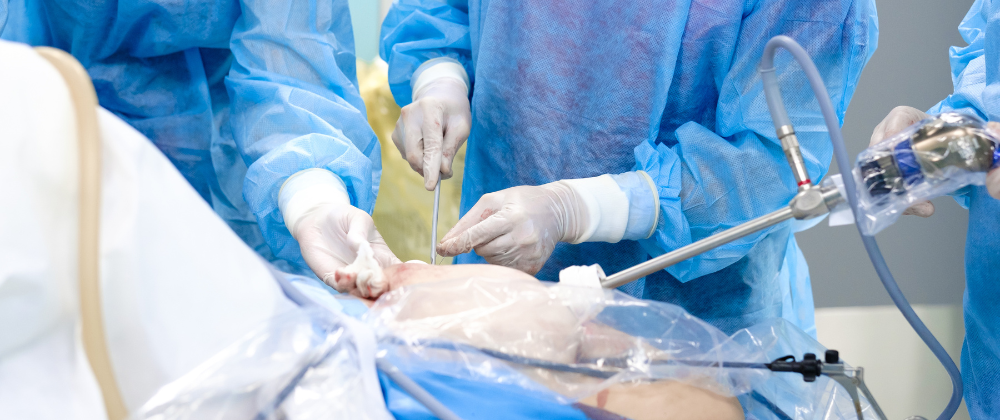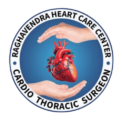Minimally Invasive Cardiac Surgery
Appointment Form

Dr. Raghavendra Murthy
MBBS, MS - General Surgery, MCh - Cardio Thoracic and Vascular Surgeron

Minimally Invasive Cardiac Surgery in Bangalore
Minimally Invasive Cardiac Surgery is a progressive approach to heart surgery that involves small incisions, resulting in less pain, quicker recovery, and fewer complications. This innovative procedure has become popular among patients in the region, where hospitals offer advanced options for those seeking effective yet less invasive heart treatments like Minimally Invasive Cardiac Surgery in Bangalore.
Under the expertise of specialists like Dr. Raghavendra Murthy, patients in Bangalore have access to a range of minimally invasive procedures, such as heart valve replacement and coronary artery bypass surgery. These surgeries are designed to support faster healing and improved patient outcomes, allowing individuals to resume their daily lives more quickly and with greater comfort.
What is Minimally Invasive Cardiac Surgery?
Minimally Invasive Cardiac Surgery is a modern surgical technique designed to treat various heart conditions through smaller incisions, which leads to reduced trauma, quicker recovery, and fewer complications compared to traditional open-heart surgery. This innovative approach encompasses procedures such as minimally invasive heart valve replacement and minimally invasive coronary artery bypass surgery. Surgeons utilize advanced tools, often incorporating robotic assistance, to ensure precision during minimally invasive heart bypass surgery. Patients undergoing minimally invasive cardiac surgery in Bangalore experience effective recovery strategies that enhance overall outcomes. This technique is especially beneficial for individuals requiring surgery for congestive heart failure or minimally invasive heart valve repair. Overall, minimally invasive cardiac surgery signifies a significant advancement in the treatment of heart diseases, improving patient comfort and quality of life.
Benefits of Minimally Invasive Cardiac Surgery
Minimally invasive cardiac surgery offers numerous advantages that make it a sought-after option for treating heart conditions in Bangalore. These benefits highlight its effectiveness and patient-centered approach, allowing for reduced recovery times and less postoperative discomfort. With advanced techniques available, minimally invasive cardiac surgery in Bangalore is transforming heart care by prioritizing patient well-being.
- Reduced Pain and Scarring: One of the most significant advantages of minimally invasive cardiac surgery is the use of smaller incisions, which leads to less pain and minimal scarring compared to traditional surgeries. Procedures like minimally invasive heart valve replacement and MICS (Minimally Invasive Cardiac Surgery) contribute to this benefit, making them a preferred choice for many patients.
- Shorter Hospital Stays: Patients typically enjoy shorter hospital stays, often returning home within a few days post-surgery. This expedited discharge is linked to the less invasive nature of the procedures, allowing patients to resume their normal activities more quickly.
- Improved Outcomes: Many patients report improved outcomes after undergoing minimally invasive heart bypass surgery. Studies indicate that these procedures often result in fewer complications and quicker healing times, enhancing overall patient satisfaction and recovery.
- Early Diagnosis Importance: Signs and symptoms of Tetralogy of Fallot typically appear in infancy, underscoring the need for timely Tetralogy of Fallot diagnosis and treatment to prevent complications.
By choosing minimally invasive cardiac surgery in Bangalore, patients are embracing a method that prioritizes their health and well-being while reducing the physical impact of surgery.
Types of Minimally Invasive Cardiac Surgery
Minimally invasive cardiac surgery is an innovative approach to treating heart conditions, offering numerous advantages over traditional methods. Minimally invasive cardiac surgery in Bangalore allows patients to benefit from less trauma, quicker recovery times, and improved surgical outcomes through advanced techniques and skilled surgeons.
- Minimally Invasive Coronary Artery Bypass Surgery: This procedure addresses coronary artery disease by creating a bypass around blocked arteries. Surgeons use small incisions to access the heart, reducing trauma and speeding up recovery. With the advancement of techniques like robotic assistance, this method offers precision while minimizing discomfort for patients.
- Heart Valve Replacement: This surgery is often necessary for patients with damaged or faulty heart valves. Utilizing minimally invasive techniques, surgeons can replace or repair the valves with smaller incisions, leading to less scarring and faster healing. Patients typically experience reduced pain and a shorter hospital stay, enhancing their overall surgical experience.
- Minimally Invasive Heart Procedures for Congestive Heart Failure: These specialized procedures target the symptoms of congestive heart failure, focusing on improving heart function while minimizing the impact of surgery. Techniques may include valve repair or other interventions designed to alleviate stress on the heart. This approach is particularly beneficial for patients who require surgery but wish to avoid the extensive recovery associated with traditional open-heart methods.
By offering various types of minimally invasive cardiac surgery in Bangalore, healthcare providers ensure that patients receive effective treatments personalised to their specific heart conditions while prioritizing comfort and recovery.
Risks of Minimally Invasive Cardiac Surgery
While minimally invasive cardiac surgery generally presents lower risks compared to traditional surgical methods, patients should be aware of potential complications. Here are some of the risks associated with these procedures:
- Infection: Despite the smaller incisions, there is still a risk of infection at the surgical site. Proper hygiene and postoperative care are crucial to minimize this risk.
- Bleeding: Patients may experience bleeding during or after surgery. Surgeons closely monitor patients for any signs of excessive blood loss, and measures are taken to manage this effectively.
- Breathing Issues: Some patients might encounter respiratory complications post-surgery, particularly those with pre-existing lung conditions. It’s important to discuss any respiratory concerns with the surgical team beforehand.
- Heart Rhythm Problems: Irregular heartbeats can occur after surgery. Monitoring and appropriate management are essential for those with a history of arrhythmias.
- Delayed Recovery: Although the aim of minimally invasive techniques is to shorten recovery time, some patients may still experience prolonged healing, especially if complications arise.
- Anesthesia Risks: As with any surgery, there are inherent risks related to anesthesia, including allergic reactions or complications related to pre-existing health issues.
Patients considering MICS bypass surgery or other minimally invasive heart procedures should have thorough discussions with their healthcare providers about their health history and any concerns regarding these risks. This dialogue will help in assessing individual risk factors and making informed decisions about the procedure. In Minimally Invasive Cardiac Surgery in Bangalore, the expertise of healthcare professionals ensures that patients receive personalized care tailored to their specific needs, ultimately enhancing the overall surgical experience.
Preparing for Minimally Invasive Cardiac Surgery
Preparing for Minimally Invasive Cardiac Surgery involves a comprehensive approach to ensure successful outcomes and a smooth recovery process. Patients should start by making lifestyle adjustments, which include following a heart-healthy diet, increasing physical activity, and discontinuing smoking to enhance overall health. A thorough medical evaluation is crucial, typically involving diagnostic tests like echocardiograms and blood tests to assess heart function. This evaluation helps identify potential complications that could affect surgery. Additionally, consultation with a cardiothoracic surgeon allows patients to gain insight into specific procedures, such as minimally invasive coronary artery bypass surgery or heart valve replacement, ensuring they understand what to expect during the process.
Following pre-surgery instructions is vital for a smooth experience. These instructions may include fasting requirements and medication adjustments. Patients should engage in open discussions with their healthcare providers to address any concerns about risks and to assess their individual health profiles. Being well-prepared not only reduces anxiety but also sets the foundation for optimal results, making a promising choice for those needing minimally invasive cardiac surgery in Bangalore for heart interventions.
How Minimally Invasive Cardiac Surgery is Better than Traditional Surgery
Minimally invasive cardiac surgery significantly enhances patient experience and outcomes compared to traditional open-heart surgery. One of the primary advantages is the reduced trauma associated with minimally invasive heart bypass surgery. Surgeons use smaller incisions, which minimizes damage to the chest muscles and surrounding tissues, leading to less pain during recovery. As a result, patients often report shorter hospital stays, enabling them to return home within a few days, which is a stark contrast to the longer recovery times associated with open-heart procedures.
Additionally, procedures such as minimally invasive cardiac bypass surgery and heart valve replacement utilize advanced techniques that enhance precision and effectiveness. The overall risk of complications, including infections and bleeding, is lower with minimally invasive techniques. This is particularly advantageous for patients needing surgery for congestive heart failure or other cardiovascular conditions. In Bangalore, many healthcare facilities offer these innovative solutions, making them a preferred option for those seeking effective heart treatments. With these benefits, minimally invasive cardiac surgery in Bangalore is transforming the landscape of cardiac care, providing patients with effective, efficient, and safer alternatives.
Surgical Techniques for Minimally Invasive Cardiac Surgery
Surgeons employ a thoracoscope—a thin, tube-like instrument with a camera—to visualize the heart through small incisions. This method allows them to perform complex minimally invasive heart procedures with minimal disruption to surrounding tissues, resulting in quicker recovery and less postoperative pain.
This technique involves using an endoscope for direct access to the heart through small incisions. Endoscopic procedures are ideal for tasks like minimally invasive heart valve repair, significantly improving patient outcomes by reducing trauma and healing time.
Combining traditional open-heart surgery with minimally invasive techniques, hybrid approaches can address complex cardiac issues while minimizing trauma. This method is particularly useful for patients needing both minimally invasive cardiac bypass and other interventions.
These techniques allow access to the heart through the skin using catheters. Procedures such as transcatheter aortic valve replacement (TAVR) are performed this way, offering patients a less invasive option with shorter recovery times.
These advanced techniques illustrate how minimally invasive cardiac surgery in Bangalore is transforming cardiac care, offering patients effective options with fewer risks compared to traditional methods.
Who Qualifies for Minimally Invasive Cardiac Surgery?
Candidates for minimally invasive cardiac surgery in Bangalore generally include individuals with specific heart conditions that can be effectively treated through smaller incisions, such as certain heart valve disorders and coronary artery disease. Conditions like aortic stenosis and mitral valve prolapse are often suitable for these procedures. Thorough evaluations consider factors such as the patient’s overall health, age, and the severity of their condition to determine eligibility for options like minimally invasive cardiothoracic surgery.
Ideal patients can expect significant benefits from these procedures, including shorter hospital stays, reduced pain, and quicker recovery times compared to traditional methods. Consulting with a specialized cardiac team in Bangalore can provide insights into individual circumstances, helping patients make informed decisions regarding their treatment options. This personalized approach ensures that candidates receive the most appropriate care tailored to their needs.
Recovering from Minimally Invasive Cardiac Surgery
- Shorter Recovery Time: Recovery from minimally invasive cardiac surgery in Bangalore is generally quicker than traditional heart surgery methods, with many patients resuming daily activities within weeks.
- Reduced Postoperative Pain: Patients experience less postoperative pain due to smaller incisions that minimize trauma and scarring.
- Variable Recovery Duration: While the recovery time can vary depending on the specific procedure, such as minimally invasive heart valve replacement or minimally invasive coronary artery bypass surgery, most patients report a smoother healing process.
- Structured Rehabilitation Program: Healthcare providers typically recommend a tailored rehabilitation program that may include light physical activity, dietary adjustments, and regular follow-ups to monitor progress.
- Maximized Benefits>: Comprehensive care enhances recovery, helping patients maximize the benefits of their minimally invasive cardiac surgery.
- Improved Outcomes: With the support of skilled medical teams in Bangalore, patients can expect better outcomes and a faster return to their normal lifestyles, making these advanced surgical options appealing for those facing heart conditions.
Comprehensive screening methods, including echocardiograms and advanced imaging tests, play a vital role in the management of Tetralogy of Fallot. For those considering Tetralogy of Fallot Repair surgery in Bangalore, these screenings are essential for achieving optimal surgical outcomes.
Diagnosis and Tests for Tetralogy of Fallot
- Echocardiograms: A primary tool for diagnosis.
- CT or MRI Scans: These imaging tests help assess the heart's structure and function.
- Stress Tests: Conducted to evaluate the heart's performance under exertion.
- Timely Diagnosis: Early detection significantly improves treatment outcomes for Tetralogy of Fallot patients.
Conclusion
Choosing Tetralogy of Fallot Repair Surgery in Bangalore grants patients access to a network of skilled specialists and advanced medical technology. With personalized care focused on effective tetralogy of Fallot management, patients can expect innovative treatment options tailored to their needs. Under the expertise of renowned cardiac surgeon Dr. Raghavendra Murthy, individuals receive comprehensive support throughout their surgical journey, ensuring high-quality outcomes and improved cardiac health. The city’s leading medical facilities are dedicated to providing reliable solutions, ultimately enhancing patients’ quality of life and recovery experiences.
Frequently Asked Questions
Diagnosis is typically through echocardiograms, chest X-rays, and MRI scans.
Recovery can vary, typically ranging from a few weeks to several months.
Yes, regular follow-ups are essential for monitoring heart health.
Patients may be advised to maintain a healthy diet, exercise, and manage stress.
Signs include chest pain, shortness of breath, and increased fatigue.
Surgery can be performed at any age, but earlier intervention is often preferred.
